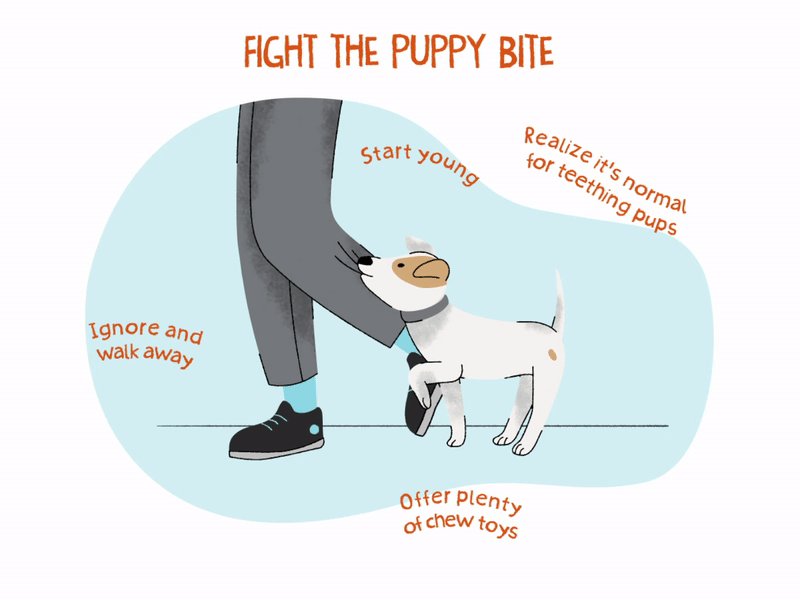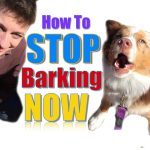To stop a puppy from biting, redirect their attention to appropriate chew toys and discourage biting by giving a firm “no” and withdrawing attention. It’s important to establish consistent rules and provide positive reinforcement for good behavior.
Puppies are known for their playful and energetic nature, but their biting behavior can be a challenge for pet owners. If left unchecked, it can lead to future aggression issues. Therefore, it is crucial to address this behavior early on.
We will explore effective techniques to stop a puppy from biting. By redirecting their focus to appropriate chew toys and discouraging biting through consistent discipline, you can help your furry friend develop good habits. With patience, consistency, and positive reinforcement, you can train your puppy to have a gentle mouth and enjoyable playtime.
The Puppy Biting Issue
To stop a puppy from biting, it’s essential to provide appropriate chew toys and redirect their biting behavior. Consistently use positive reinforcement and avoid physical punishment. Additionally, ensure regular exercise and mental stimulation to prevent boredom and excessive nipping.
Why Puppies Bite
Puppies are adorable, but they can be quite a handful! One common issue that puppy owners face is biting. Puppies use their mouths to explore the world around them, and biting is a natural part of their development. However, if not addressed, this behavior can become a major problem. In this section, we’ll explore why puppies bite and what you can do to stop it. When puppies are young, they explore the world around them with their mouths. This is a natural behavior that helps them learn about their environment. Puppies also use their mouths to play with each other and with their owners. However, if left unchecked, this behavior can become problematic. Puppies may start biting harder or more frequently, which can be painful and potentially dangerous.When Biting Becomes A Problem
Biting becomes a problem when puppies start to bite too hard or too frequently. This can be a sign of aggression or over-excitement. If your puppy is biting you or other people in a way that is painful or aggressive, it’s important to address the issue as soon as possible. One common mistake that puppy owners make is to ignore the biting behavior, thinking that their puppy will grow out of it. However, this rarely happens without intervention. If your puppy is biting excessively, it’s important to take action to stop the behavior before it becomes a habit.How To Stop A Puppy From Biting
Now that we’ve discussed why puppies bite and when it becomes a problem, let’s explore some strategies for stopping the behavior. Here are some tips to help you stop your puppy from biting:- Provide appropriate chew toys for your puppy to chew on instead of biting people or objects.
- Redirect your puppy’s biting behavior by offering a toy or treat when they start to bite.
- Use positive reinforcement to reward good behavior and discourage biting.
- Teach your puppy basic obedience commands such as “sit” and “stay” to help them learn self-control.
- Consistently enforce rules and boundaries to help your puppy understand what is and isn’t acceptable behavior.

Credit: m.youtube.com
Early Signs Of Aggressive Biting
Puppies may show early signs of aggressive biting, such as growling and snapping. To stop this behavior, provide appropriate chew toys, use positive reinforcement, and redirect their attention when they start biting. Consistency and patience are key to teaching puppies not to bite.
Puppies are adorable, but they can also be quite a handful, especially when it comes to biting. While some biting is normal behavior for puppies who are exploring their world, it’s important to recognize the early signs of aggressive biting. Early intervention can help prevent the development of more serious biting issues down the line.Recognizing Warning Signals
As a responsible pet owner, it’s important to keep an eye out for early warning signals that your puppy’s biting is becoming more aggressive. Some signs to look out for include:- Growling or snarling while biting
- Biting that breaks the skin or causes bruising
- Biting that occurs in response to being touched or approached
- Biting that seems to come out of nowhere, without any provocation
Distinguishing Playful Biting From Aggressive Biting
Not all biting is aggressive. Sometimes, puppies bite as a form of play or exploration. It’s important to be able to distinguish between playful biting and aggressive biting, so you can respond appropriately.| Playful Biting | Aggressive Biting |
|---|---|
| Biting is gentle and does not cause pain | Biting is hard and may cause pain or injury |
| Biting occurs during play or exploration | Biting occurs in response to being touched or approached |
| Puppy wags tail and seems happy while biting | Puppy growls or snarls while biting |
Immediate Actions To Take
To stop a puppy from biting, immediately redirect their attention to a chew toy. Use positive reinforcement when they play nicely. Consistently enforce this training technique to discourage biting behavior effectively.
When it comes to stopping a puppy from biting, taking immediate actions is crucial. Puppies explore the world with their mouths, and while it may seem cute at first, their biting behavior can become a problem if not addressed early on. In this section, we will discuss some effective immediate actions you can take to redirect their energy and provide them with appropriate outlets for their biting instincts.Redirecting Their Energy
One of the first steps in stopping a puppy from biting is redirecting their energy towards more appropriate behaviors. When you notice your puppy starting to bite, it’s essential to intervene promptly and redirect their attention elsewhere. Here are some strategies you can try:- Offer a chew toy or bone that is specifically designed for teething puppies. This will not only provide relief for their sore gums but also redirect their biting behavior onto an appropriate item.
- Engage in playtime with your puppy using interactive toys, such as a rope or tug toy. This helps them release their energy in a positive and controlled manner.
- Encourage your puppy to engage in mental stimulation activities, like puzzle toys or treat-dispensing toys. This will divert their focus away from biting and onto problem-solving.
Using Toys As Distractions
Toys can serve as effective distractions when it comes to stopping a puppy from biting. By providing your puppy with a variety of toys, you can redirect their attention and give them an outlet for their biting instincts. Here are some tips for using toys as distractions:- Rotate their toys regularly to keep their interest high. Introduce new toys periodically to prevent boredom and maintain their engagement.
- Use toys that are different in texture, shape, and size. This variety will keep your puppy interested and prevent them from getting fixated on one particular item.
- Play interactive games with your puppy using toys, such as fetch or hide-and-seek. This will not only distract them from biting but also provide them with mental and physical exercise.

Credit: pupford.com
Training Methods To Discourage Biting
Training methods are crucial to stop a puppy from biting. Implementing effective techniques early can help shape your puppy’s behavior positively.
Positive Reinforcement Techniques
Positive reinforcement involves rewarding good behavior to encourage its repetition. When your puppy refrains from biting, praise and offer treats to reinforce this desired behavior.
The Time-out Strategy
Time-out is an effective method to discourage biting. When your puppy bites, say “no” firmly, then remove them from the situation for a brief period to emphasize that biting leads to isolation.
Socialization And Its Impact
Socialization plays a crucial role in shaping a puppy’s behavior and preventing biting. It helps them learn how to interact with other dogs and people, making them more well-adjusted and less likely to resort to biting. Early socialization is especially vital in a puppy’s development, as it sets the foundation for their future behavior.
Importance Of Early Socialization
Early socialization is essential for puppies to learn appropriate behavior and develop positive interactions with other dogs and humans. It helps them feel more comfortable and less anxious in different situations, reducing the likelihood of them resorting to biting as a response to fear or uncertainty.
Safe Socialization Practices
It’s important to introduce puppies to a variety of experiences, environments, and people in a safe and controlled manner. This can include supervised playdates with other vaccinated dogs, positive exposure to different sounds and environments, and gentle interactions with various individuals. Ensuring that these experiences are positive and non-threatening is key to successful socialization.
Communication And Understanding
Communication and understanding are key when it comes to stopping a puppy from biting. Learning to interpret your puppy’s body language and responding appropriately to biting are crucial aspects of effective communication and understanding.
Learning Puppy Body Language
Understanding your puppy’s body language is essential for effective communication. Look for signs such as flattened ears, a stiff body, or a tense tail, which may indicate that your puppy is feeling threatened or anxious. Conversely, a relaxed body posture and wagging tail signal a calm and content puppy. By learning to interpret these cues, you can better understand your puppy’s emotions and address their needs accordingly.
Responding Appropriately To Biting
When your puppy engages in biting behavior, it’s crucial to respond appropriately. Avoid harsh punishment, as this can lead to fear and aggression. Instead, offer a firm “no” and redirect their attention to a suitable chew toy. This teaches the puppy that biting is unacceptable while providing an alternative outlet for their chewing instincts. Consistency in your response is key to effectively communicating boundaries to your puppy.
Professional Help And When To Seek It
If you’re struggling to stop your puppy from biting, seeking professional help can be a game-changer. With expert guidance, you’ll learn effective techniques to redirect your puppy’s behavior and establish boundaries, ensuring a happy and bite-free environment for both of you.
Puppies are adorable, but their biting can be a cause for concern. While most cases of puppy biting can be managed through consistent training and positive reinforcement, there are instances where seeking professional help becomes necessary. Knowing when to seek the assistance of a professional trainer is crucial to ensure the well-being of both the puppy and the owner. In this section, we will discuss the signs that indicate the need for professional help and how to choose the right trainer.Identifying The Need For A Trainer
If your puppy’s biting behavior is persistent and shows no signs of improvement despite your efforts, it may be time to consider consulting a professional trainer. Additionally, if the puppy’s biting is aggressive, causing injury, or if the puppy displays other behavioral issues, it’s imperative to seek assistance from a qualified trainer. Furthermore, if the puppy’s biting is causing distress or fear in the household, professional intervention may be necessary to address the underlying causes of the behavior.Choosing The Right Professional
When seeking professional help for your puppy’s biting behavior, it’s essential to choose a trainer who is experienced and knowledgeable in dealing with puppy behavior. Look for trainers who specialize in positive reinforcement training methods and have a good understanding of puppy development. Ensure that the trainer has a positive reputation and is certified by a reputable organization. Additionally, consider the trainer’s approach to addressing behavioral issues and their ability to provide personalized guidance based on your puppy’s specific needs. When it comes to choosing a professional trainer, it’s crucial to prioritize qualifications and experience to ensure the best possible outcome for your puppy’s behavior.
Credit: pupford.com
Maintaining Progress And Consistency
When it comes to stopping a puppy from biting, maintaining progress and consistency is key to success. Once you have established a routine and started training and socialization, it’s important to continue reinforcing these efforts to ensure your puppy develops good habits. Consistency in your approach will help your puppy understand what is expected and what behavior is not acceptable.
Setting A Routine
Setting a routine provides structure for your puppy and helps them understand what to expect each day. Consistent feeding times, play sessions, and training exercises can help reduce biting behavior as your puppy becomes more familiar with the daily routine. Additionally, ensure that your puppy gets plenty of exercise and mental stimulation to prevent boredom, which can lead to increased biting tendencies.
Continued Training And Socialization
Continued training and socialization are crucial for reinforcing good behavior in puppies. Use positive reinforcement techniques to encourage good behavior, such as rewarding your puppy with treats and praise when they exhibit gentle play or refrain from biting. Regular socialization with other dogs and people can also help your puppy learn appropriate play behavior and develop bite inhibition.
Frequently Asked Questions
How Do You Discipline A Puppy Who Is Biting?
To discipline a biting puppy, redirect their attention to a chew toy or bone when they start biting. Say “no” in a firm tone and withdraw attention if they continue to bite. Consistently reinforce positive behavior with treats and praise.
Avoid physical punishment or yelling as it can worsen behavior. Seek professional help if the biting persists.
How To Stop Your Puppy From Biting You?
To stop your puppy from biting you, try these tips: 1. Give your puppy chew toys to redirect their biting behavior. 2. Teach them the “no bite” command and consistently reinforce it. 3. Use positive reinforcement when they follow the command correctly.
4. Avoid playing rough with your puppy. 5. Consistently socialize your puppy with other dogs to reduce their aggressive behavior.
At What Age Do Puppies Stop Biting?
Puppies typically stop biting at around 6 to 9 months old as they outgrow their teething phase.
What Command Stops A Puppy From Biting?
Use the “Leave It” command to stop a puppy from biting. Redirect their focus onto a toy or treat instead.
Conclusion
Stopping a puppy from biting requires consistency, patience, and positive reinforcement. By implementing proper training techniques and redirecting their behavior, you can help your puppy learn appropriate chewing habits. Remember to stay calm and avoid using harsh punishments to foster a strong bond with your furry friend.



